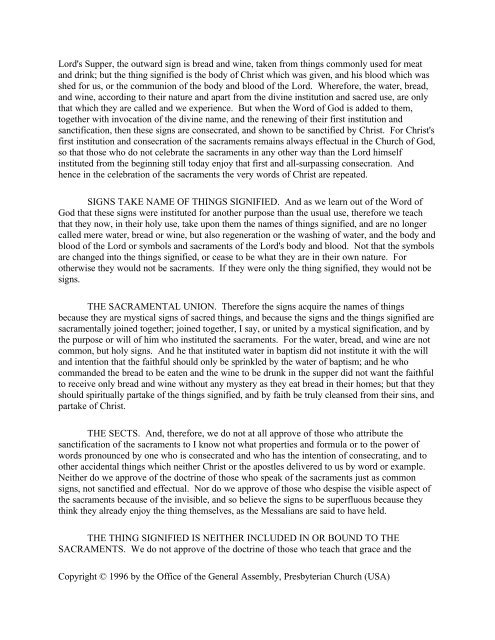The Book of Confessions - The Presbyterian Leader
The Book of Confessions - The Presbyterian Leader
The Book of Confessions - The Presbyterian Leader
You also want an ePaper? Increase the reach of your titles
YUMPU automatically turns print PDFs into web optimized ePapers that Google loves.
Lord's Supper, the outward sign is bread and wine, taken from things commonly used for meat<br />
and drink; but the thing signified is the body <strong>of</strong> Christ which was given, and his blood which was<br />
shed for us, or the communion <strong>of</strong> the body and blood <strong>of</strong> the Lord. Wherefore, the water, bread,<br />
and wine, according to their nature and apart from the divine institution and sacred use, are only<br />
that which they are called and we experience. But when the Word <strong>of</strong> God is added to them,<br />
together with invocation <strong>of</strong> the divine name, and the renewing <strong>of</strong> their first institution and<br />
sanctification, then these signs are consecrated, and shown to be sanctified by Christ. For Christ's<br />
first institution and consecration <strong>of</strong> the sacraments remains always effectual in the Church <strong>of</strong> God,<br />
so that those who do not celebrate the sacraments in any other way than the Lord himself<br />
instituted from the beginning still today enjoy that first and all-surpassing consecration. And<br />
hence in the celebration <strong>of</strong> the sacraments the very words <strong>of</strong> Christ are repeated.<br />
SIGNS TAKE NAME OF THINGS SIGNIFIED. And as we learn out <strong>of</strong> the Word <strong>of</strong><br />
God that these signs were instituted for another purpose than the usual use, therefore we teach<br />
that they now, in their holy use, take upon them the names <strong>of</strong> things signified, and are no longer<br />
called mere water, bread or wine, but also regeneration or the washing <strong>of</strong> water, and the body and<br />
blood <strong>of</strong> the Lord or symbols and sacraments <strong>of</strong> the Lord's body and blood. Not that the symbols<br />
are changed into the things signified, or cease to be what they are in their own nature. For<br />
otherwise they would not be sacraments. If they were only the thing signified, they would not be<br />
signs.<br />
THE SACRAMENTAL UNION. <strong>The</strong>refore the signs acquire the names <strong>of</strong> things<br />
because they are mystical signs <strong>of</strong> sacred things, and because the signs and the things signified are<br />
sacramentally joined together; joined together, I say, or united by a mystical signification, and by<br />
the purpose or will <strong>of</strong> him who instituted the sacraments. For the water, bread, and wine are not<br />
common, but holy signs. And he that instituted water in baptism did not institute it with the will<br />
and intention that the faithful should only be sprinkled by the water <strong>of</strong> baptism; and he who<br />
commanded the bread to be eaten and the wine to be drunk in the supper did not want the faithful<br />
to receive only bread and wine without any mystery as they eat bread in their homes; but that they<br />
should spiritually partake <strong>of</strong> the things signified, and by faith be truly cleansed from their sins, and<br />
partake <strong>of</strong> Christ.<br />
THE SECTS. And, therefore, we do not at all approve <strong>of</strong> those who attribute the<br />
sanctification <strong>of</strong> the sacraments to I know not what properties and formula or to the power <strong>of</strong><br />
words pronounced by one who is consecrated and who has the intention <strong>of</strong> consecrating, and to<br />
other accidental things which neither Christ or the apostles delivered to us by word or example.<br />
Neither do we approve <strong>of</strong> the doctrine <strong>of</strong> those who speak <strong>of</strong> the sacraments just as common<br />
signs, not sanctified and effectual. Nor do we approve <strong>of</strong> those who despise the visible aspect <strong>of</strong><br />
the sacraments because <strong>of</strong> the invisible, and so believe the signs to be superfluous because they<br />
think they already enjoy the thing themselves, as the Messalians are said to have held.<br />
THE THING SIGNIFIED IS NEITHER INCLUDED IN OR BOUND TO THE<br />
SACRAMENTS. We do not approve <strong>of</strong> the doctrine <strong>of</strong> those who teach that grace and the<br />
Copyright © 1996 by the Office <strong>of</strong> the General Assembly, <strong>Presbyterian</strong> Church (USA)




